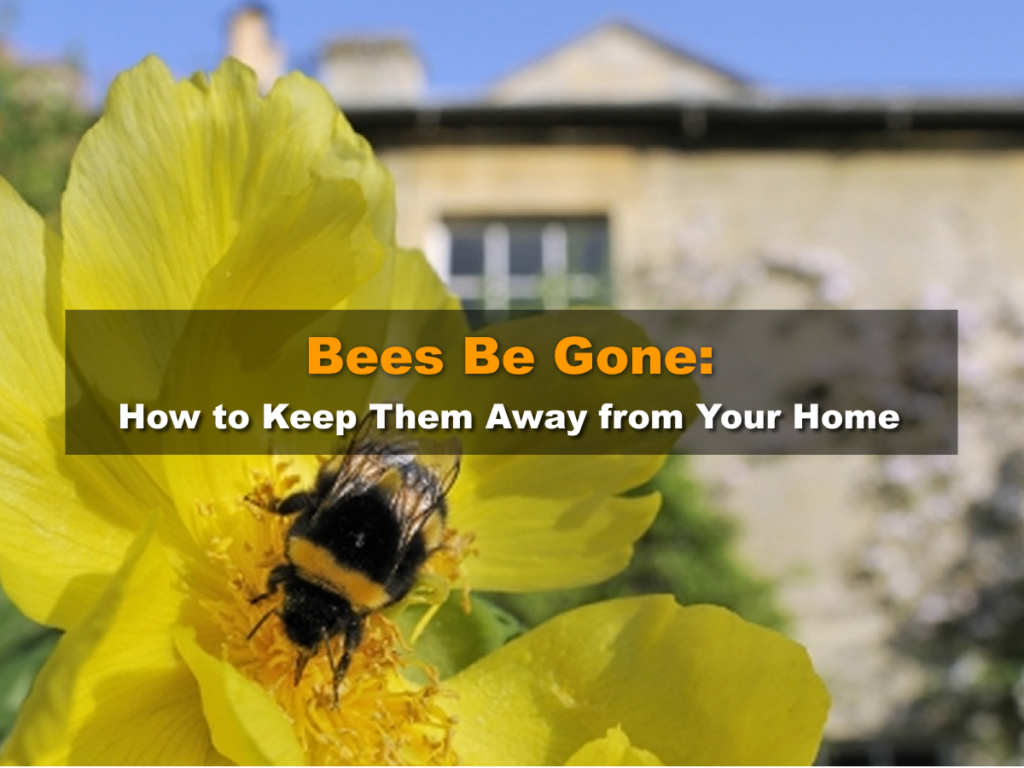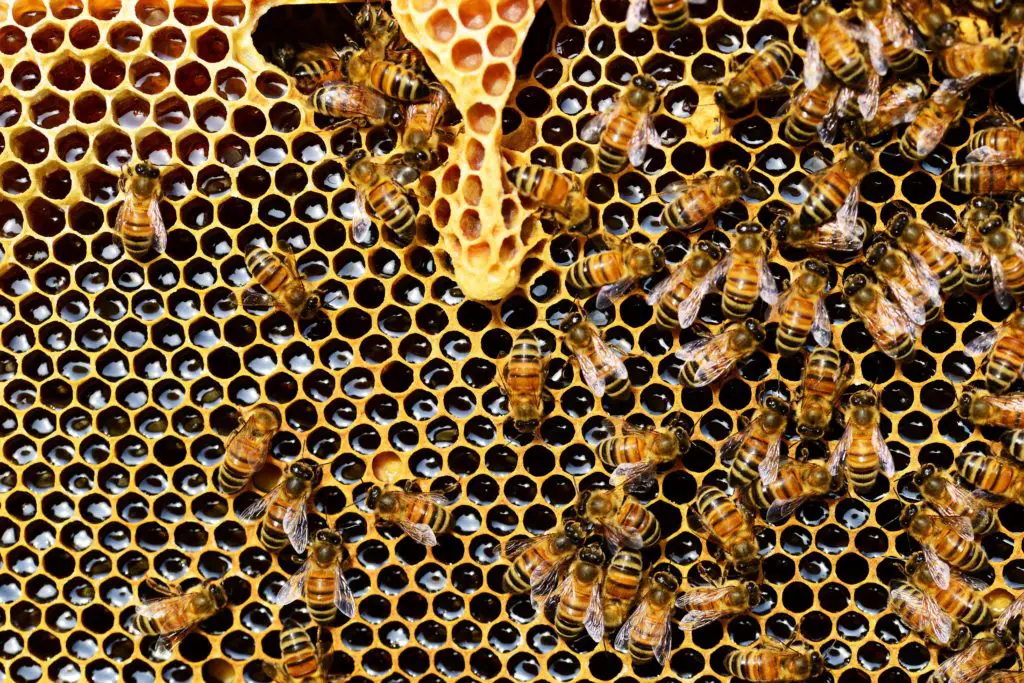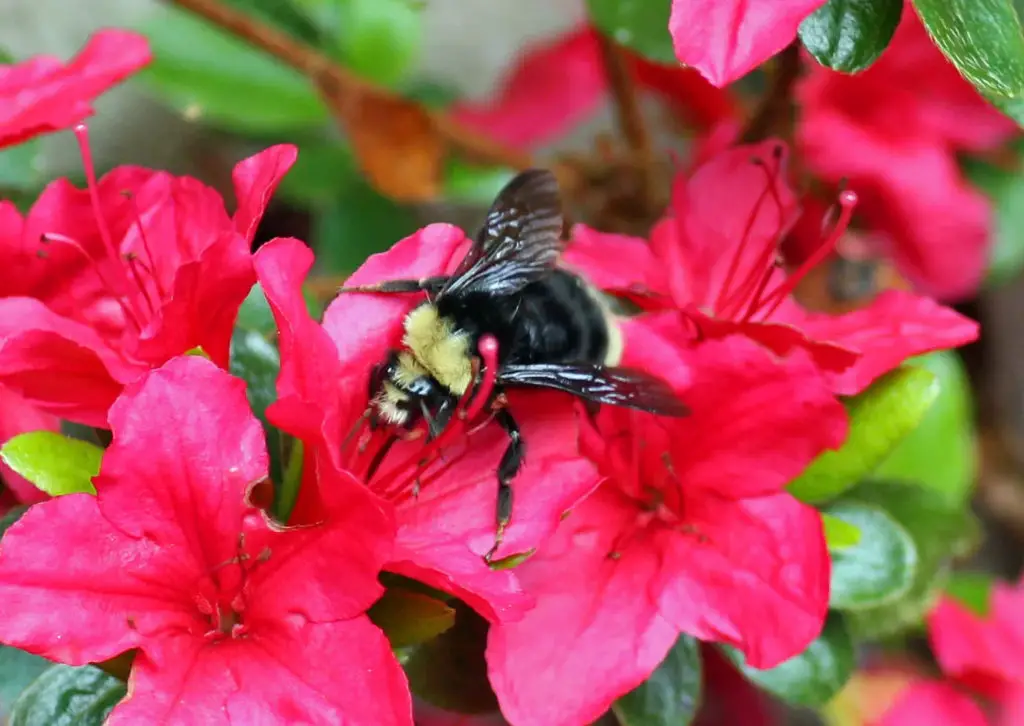Affiliate Disclaimer - As an Amazon Associate I earn from qualifying purchases.
It supports the website. So, Thank you
There are a whopping 20,000 species of bees in the world and more than 3600 of these live in North America. So, you’re going to find yourself confronted with bees on a regular basis. That’s fine, for the most part as bees are a welcome and natural part of the ecosystem. However, sometimes they can become a pest and people are keen to find out how to make bees go away.
There are lots of natural ways that you can deter bees that won’t harm them. It is also possible to use pesticides but I’d only recommend chemical treatments in extremely severe cases as the last thing we want to do is hurt these precious animals.
In this guide, I’ll talk you through some easy and effective ways of getting rid of bees without causing them any harm.
Table of Contents
Using Plants To Get Rid Of Bees
If you’re looking to make bees go away then you might think that adding more plants to your garden is counterproductive; after all, bees like plants, right?
Yes, it’s true, bees are attracted to a whole host of flowering plants but there are some that they really don’t like. The more of these that you can plant around your garden, the less likely it will be that bees pay you a visit.
It’s mainly very potent-smelling plants that make bees turn around and fly in the opposite direction. Choose things like neem, cloves, eucalyptus, and citronella for the best effect. What’s great is that these plants can all be grown in pots so you can strategically place them around outdoor dining areas, seating areas, and anywhere else you wish to keep pests at bay.
As I mentioned, there are many plants that bees love so avoiding having these in your garden will keep bees away. While the list is extensive, some of the most common flowering plants that attract bees are:
- Beebalm
- Coneflowers
- Crocus
- Marjoram
- Pussy willow
- Foxgloves
- Lavender
- Crab apple
- Lilac
- Aster
- Geranium
Using Things From Your Kitchen To Get Rid Of Bees
Did you know that your kitchen is packed with ingredients that you can use to repel bees? If you find that your summer BBQs are often ruined by a lot of bees buzzing around, you could bring these ingredients outside and sprinkle them around the affected areas to keep those pesky bees away.
Cinnamon powder is one of the most effective because bees just hate the smell of it. It’s totally natural so you can sprinkle it around your garden without causing any harm to the local wildlife of your prized plants. This also works well if you have a bee’s nest in the ground; just sprinkle the powder around the nest and watch the bees fly away.
Garlic is another ingredient that bees detest and this can also come in powder form so it’s really easy to distribute around the garden. Again, use it on ground nests to send the bees packing or you can boil garlic and mix it with water to spray on nests and affected areas.
We all have a bottle or two of vinegar in the kitchen and this can really come in handy when you’re trying to make bees go away. While it is a very potent substance, it’s totally harmless both to the bees and any other living thing in your garden. You can mix equal parts water and vinegar in a spray bottle and go to town on plants, seating areas and bee’s nests.
If you have some spare cucumber lying around then this can also act as a bee repellent. However, it won’t work on its own, you’ll need an aluminum tray, pie dish, or something similar as the cucumber needs to react with the metal. When it does, it produces a smell that bees just cannot stand and they’ll quickly leave your garden. Just cut up slices of cucumber, place them on your aluminum tray, and pop it outside to work its magic.
Using Essential Oils To Get Rid Of Bees
Essential oils work so well in a variety of situations and that includes getting rid of bees. There are certain ones that work better than others such as cedarwood, peppermint, eucalyptus and citronella oil. What’s more, these oils can keep a variety of other pests away so if you’re looking for a creepy-crawly-free garden, this is a brilliant solution.
You will need to mix your chosen essential oil with water and you’re only going to need a few drops. It can also help to add a couple of teaspoons of dish soap to oils like peppermint in order to make the mixture more effective.
It’s then simply a case of spraying the solution on outdoor areas where bees are often found, around nests and on your plants. It’s all-natural and even when you add dish soap, this is gentle enough that it won’t do any harm to your garden greenery.
Using Mothballs To Get Rid Of Bees
Most people assume that mothballs are only for moths but this isn’t the case. The smell of these pest controllers is enough to send bees packing for good and they won’t do them any harm. Many people hang them in outdoor areas where bees are a problem, for example around a swimming pool or on a patio.
Usually, the smell isn’t strong enough that it’ll bother humans so your outdoor time won’t be ruined nor will it be interrupted by bees.
Using A Natural Bee Lure
If you’re looking to get rid of bees in the most natural way then luring them away with a sweet treat is a great idea.
Choose a sweet fruit, mango works very well, and place this into an open Ziploc bag. Make sure to place it a decent distance from the nest but not so far that the bees won’t be able to pick up on the scent. Around twenty feet should be sufficient.
You’ll need to leave the bag for three days and then move it back a little further. The bees will already be aware of the food source so will be willing to travel a little further to get to it. Every few days, move the fruit further and further away. The hope is that the bees will be lured away and will set up home somewhere else.
Should I Use Pesticides To Make Bees Go Away?
The question of whether or not you should use a chemical treatment like bee sprays or powders is more of a moral one than anything else.
Bees are some of the most important pollinators on the planet and without them, the world would be a vastly different place. For this reason, it is advised that you don’t kill bees when trying to get rid of them but use natural methods to deter them.
Of course, there are going to be situations where natural methods do not work and you have no other choice but to turn to pesticides. This might be a very severe bee infestation within the timber of your home or a nest of particularly aggressive bees in your garden.
When To Call Pest Control Specialists
Sometimes, you can do everything in your power to banish bees from your backyard and yet they persist. In most cases, the tips and tricks I have talked about in this guide will be enough; you could even use a combination for the greatest effect.
However, if you find that the bees keep returning or they’re too stubborn to retreat even after you’ve tried these tips, you may need to call for help.
There will be an abundance of local pest control companies in your area so take the time to read Google reviews to find one with the best reputation. A lot of pest control companies will try to use natural methods before resorting to chemical treatments so if you’re worried about hurting the bees, there’s really no need to be.
That said, I have read a lot of online advice from pest controllers who are reluctant to remove ground bee nests. The reason for this is that disturbing the nest could harm its success and ground bees will only be present for a very short time. Pest controllers usually put their focus on bees that nest in the fabric of your home or that are a severe problem.
Final Thoughts
Bees are part of nature and you’ll often see them buzzing around your backyard. In most cases, they’ll do no harm and will fly away of their own accord. But what happens when you have too many bee visitors? You’ll need to know how to make bees go away and there are, fortunately, some very effective natural methods.
While using chemicals isn’t the best idea because we don’t want to harm the bees, there is sometimes no other choice. In severe situations, you may also need to enlist the help of a specialist pest controller.








